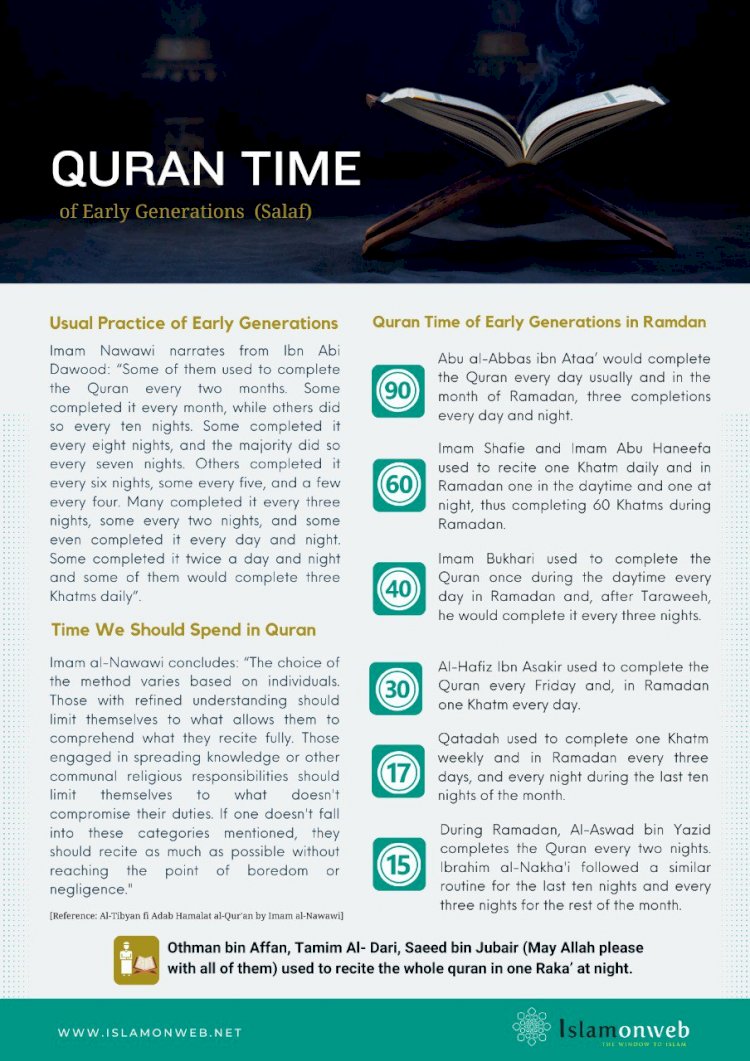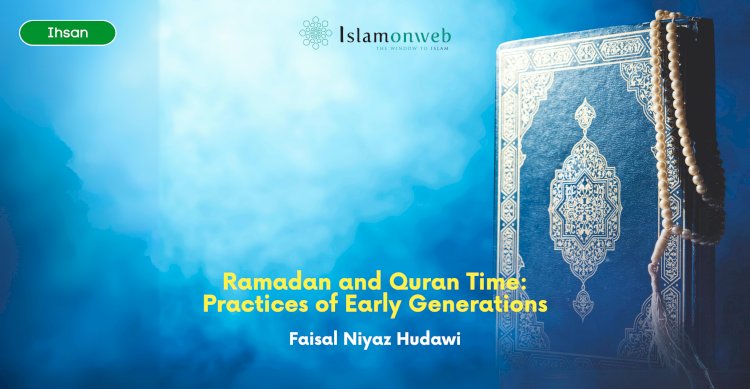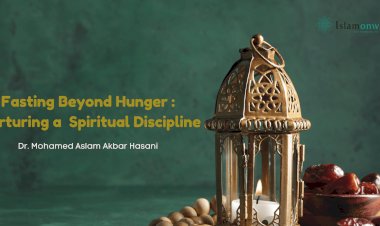Ramadan and Quran Time: Practices of Early Generations
Engaging in the recitation of the Quran holds profound significance, especially during the sacred month of Ramadan. The pious predecessors (salaf salihoon) demonstrated dedicated commitments to regular Quranic recitation as part of their daily practice. In Ramadan, this will intensify, and most of the time will be spent in Quran recitation, even avoiding engagements in public speeches and classes. This rich tradition emphasises the spiritual importance of consistently immersing oneself in the recitation of the Quran, fostering a deep connection with the divine verses. It is a practice often intensified during the blessed month of Ramadan.
Allah, the Exalted, has praised Ramadan, the month of fasting, highlighting its distinction among other months by being chosen for the revelation of the magnificent Quran, as expressed in the verse: "The month of Ramadan [is that] in which was revealed the Quran, a guidance for the people and clear proofs of guidance and criterion." (Quran, 2:185)
Some hadiths indicate that Allah, exalted be He, honoured this month by descending other divine scriptures upon the prophets.
In a narration by Imam Ahmed, Wathila bin Al-Asqa' reported that the Messenger of Allah (PBUH) said, "The scriptures of Ibrahim were revealed on the first night of Ramadan, the Torah (Tawraat) on the sixth night of Ramadan, the Gospel (Injeel) on the thirteenth night of Ramadan, and the Quran was revealed in its entirety on twenty-fourth night of Ramadan."
Due to this divine connection between the Quran and Ramadan, the Prophet Muhammad (PBUH) extended his recitations during Ramadan nights, intensifying his engagement with the Quran. Hadiths stress the spiritual merit of dedicating oneself to the Quran during this blessed month.

Ibn Rajab al-Hanbali says: In the narration of Ibn Abbas, the nighttime study sessions between the Prophet and Jibreel indicate the desirability of increasing Quranic recitation during Ramadan nights. The night serves as a tranquil period, free from distractions, where hearts and tongues align in reflection, as emphasised by Allah: "Indeed, the hours of the night are more effective for concurrence [of heart and tongue] and more suitable for words." (Quran, 73:6)
This underscores the importance of intensifying Quranic recitation during the nights of Ramadan, given the spiritual benefits of tranquillity and heightened focus during this sacred month.
The Prophet Muhammad (peace be upon him) used to prolong his night prayers, especially during Ramadan, more than at other times. It is narrated that Hudhaifah prayed with him one night, and the Prophet recited Surah Al-Baqarah, then Al-Nisa, and then Al-Imran. He would pause at every verse of admonition, inquiring and seeking understanding. The Prophet did not complete the two Rak'ahs until Bilal came and called for the Fajr prayer. (Sahih Muslim)
Abu Dharr also reported that the Prophet engaged in night prayers for one-third of the night during the twenty-third night and half the night during the twenty-fifth night of Ramadan. When they requested to pray the remaining part of the night, he replied, "When a person prays with the Imam until he finishes, the rest of the night is recorded for him." (Sunan Abi Dawood)
The Prophet Muhammad (PBUH) encouraged frequent recitation, stating, "The example of a believer who recites the Quran is that of a citron, its taste is good, and its scent is fragrant." (Sahih al-Bukhari) Ramadan provides a unique opportunity to strengthen this connection, with individuals often aiming to complete multiple recitations (Khatm) throughout the month, echoing the virtuous actions of our pious predecessors.
Imam al-Nawawi, may Allah have mercy on him, in his valuable book "Al-Tibyan fi Adab Hamalat al-Qur'an", dedicated a chapter to the stance of the early generations towards the Quran. In it, he stated:
"It is essential to preserve and increase the Quran's recitation. The early generations, may Allah be pleased with them, had various practices in terms of completing the Quran. Ibn Abi Dawood narrated from some of the early scholars, may Allah be pleased with them, that they used to complete the Quran every two months. Some completed it every month, while others did so every ten nights. Some completed it every eight nights, and most did so every seven nights. Others completed it every six nights, some every five, and a few every four. Many completed it every three nights, some every two nights, and some even completed it every day and night. Some completed it twice in a day and night.
Those who completed it in a day and night included Uthman ibn Affan, Tamim al-Dari, Saeed ibn Jubair, Mujahid, Imam al-Shafi'i, and others. Those who completed it three times included Salim ibn Umar, the judge of Egypt during the caliphate of Muawiyah. Abu Bakr, ibn Abi Dawood, narrated with a sound chain that he used to complete four times a night. Abu Umar al-Kindi, in his book about the judges of Egypt, narrated that he used to complete it four times a night.
Consider this astonishing report: some completed it eight times in a day and night. The righteous Sheikh Abu Abd al-Rahman al-Salmi, may Allah be pleased with him, heard Sheikh Abu Uthman al-Maghribi say: Ibn al-Katib, may Allah be pleased with him, used to complete it four times during the day and four times during the night. This is the most we have heard of in a day and night.
The honourable Sayyid Ahmad al-Durqi narrated, with an authentic chain, from Mansur ibn Zadan, one of the worshippers among the Tabi'in, that he used to complete the Quran between Dhuhr and Asr and also between Maghrib and Isha during Ramadan, thus completing it four times a day. Abu Dawood, with a sound chain, narrated that Mujahid used to complete the Quran between Maghrib and Isha. Mansur said Ali al-Azdi used to complete it between Maghrib and Isha every night during Ramadan. Ibrahim ibn Sa'd said: My father used to seclude himself, and he did not break his seclusion until he completed the Quran.
After narrating the above reports Imam al-Nawawi, may Allah have mercy on him, then comments: “The one who completes it in one rak'ah, their number cannot be counted due to their abundance. Among those who advanced in this practice among Sahaba were Uthman ibn Affan, Tamim al-Dari, and Saeed ibn Jubair; may Allah be pleased with them. They used to complete it in every rak'ah in the Kaaba. As for those who completed it weekly, many narrations attribute this practice to Uthman ibn Affan, Abdullah ibn Mas'ud, Zaid ibn Thabit, and Ubayy ibn Ka'b; may Allah be pleased with them. Also, among the Tabi'in were Abdul Rahman ibn Yazid, Alqamah, and Ibrahim; may Allah have mercy on them.
Let’s explore examples of our early generations' Quran recitations during Ramadan.
The famous Sufi scholar of the 4th Hijri century, Abu al-Abbas ibn Ataa, would usually complete the Quran every day, and in the month of Ramadan, there were three completions every day and night.
When we examine the practices of Salaf in Quran recitation, we may be astonished by their commitment and dedication. For example, Imam Shafie and Imam Abu Haneefa used to recite one Khatm daily, one in the daytime and one at night, thus completing 60 Khatms during Ramadan.
Imam Bukhari used to complete the Quran once during the daytime every day in Ramadan, and after Taraweeh, he would complete it every three nights. Al-Hafiz Ibn Asakir used to complete the Quran every Friday, and during Ramadan, one Khatm was completed every day. Qatadah used to complete one Khatm weekly, every three days during Ramadan, and every night during the last ten nights.
During Ramadan, Al-Aswad bin Yazid completes the Quran every two nights. Ibrahim al-Nakha'i followed a similar routine for the last ten nights and every three nights for the rest of the month.
Before concluding, let me quote Imam al-Nawawi again from the same source: “The choice of the method varies based on individuals. Those with refined understanding should limit themselves to what allows them to comprehend what they recite fully. Those engaged in spreading knowledge or other communal religious responsibilities should limit themselves to what doesn't compromise their duties. If one doesn't fall into these categories mentioned, they should recite as much as possible without reaching the point of boredom or negligence."
[Reference: Al-Tibyan fi Adab Hamalat al-Qur'an by Imam al-Nawawi]
About the author: Faisal Niyaz Hudawi is a postgraduate of Darul Huda Islamic University, Kerala, India, in Islamic Studies. His research interests include Islamic economics and finance, as well as Muslim world politics. He is interested in digital activism and founded Islamonweb.net and thesite.in. He has been a resident of Qatar for more than 12 years
Disclaimer
The views expressed in this article are the author’s own and do not necessarily mirror Islamonweb’s editorial stance.
























Leave A Comment